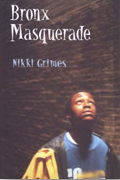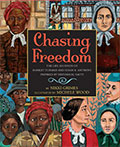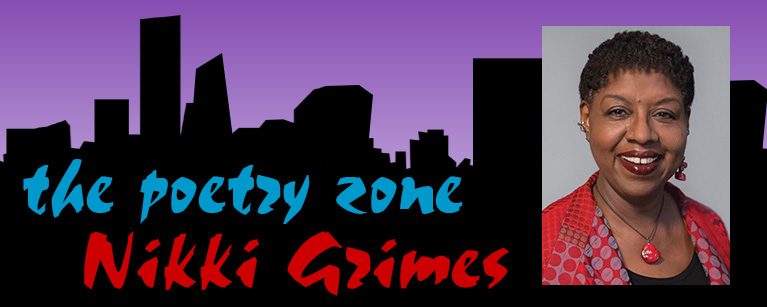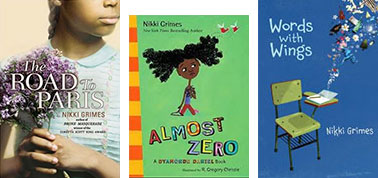Have you ever been on a blog tour? This is my first time being part of one. Blame Children’s Poet Laureate, Kenn Nesbitt. He’s the one who roped me into this! Seriously, though, I’m happy to join the My Writing Process Blog Tour. I hope you can take something meaningful from my responses to the four questions posed.
WHAT AM I WORKING ON NOW?
 As always, I’m juggling projects. I seem to be allergic to working on one manuscript at a time.
As always, I’m juggling projects. I seem to be allergic to working on one manuscript at a time.
First, I’m waist-deep into a Bronx Masquerade sequel, which means I’m too far in to turn back, but not so far that I’ve ceased shaking in my boots for fear I won’t be able to live up to my own expectations, let alone the expectations of my fans. Yikes! But I press on.
I’m also working on a novel-in-verse for Boyds Mills, publisher of Words With Wings.
 Lastly, I’m writing a middle-grade collection of poetry inspired by poems/poets of the Harlem renaissance. This last is for Bloomsbury, publisher of my novel-in-verse Planet Middle School.
Lastly, I’m writing a middle-grade collection of poetry inspired by poems/poets of the Harlem renaissance. This last is for Bloomsbury, publisher of my novel-in-verse Planet Middle School.
HOW DOES MY WORK DIFFER FROM OTHERS IN MY GENRE?
First of all, I work in more than one genre, so there’s that! Besides that, I’m not sure this question is answerable, at least not by me. I know that my work is distinct, perhaps in part because it is character-driven. Or perhaps it is that my poetry is compact, yet always delivers an emotional punch. Yes. That’s it. In any case, it is this aspect of my work that is most often commented on, so let’s go with that.
WHY DO I WRITE WHAT I WRITE?
In general, I look for subject matter that allows me to address those issues I feel affect the lives of young readers, and that I believe need to be discussed and explored. I wrote The Road to Paris because I didn’t find many books tackling the often-difficult experiences of children caught up in the foster-care system.
I wrote Almost Zero: A Dyamonde Daniel Book to address the subject of entitlement because I see this trend everywhere, and it disturbs me. I felt compelled to speak into it.
I wrote Words With Wings because I fear this generation has forgotten the value of daydreaming and I’m hoping my book will spark discussion of this topic, and perhaps inspire a bit of daydreaming, along the way.
 Sometimes, of course, I write a book simply because a certain story captures my imagination or curiosity. Chasing Freedom, a book coming out next year with Orchard Books, is one such title. It’s an imagined conversation between Harriet Tubman and Susan B. Anthony, inspired by my fascination with both women, and the fact that their extraordinary lives happened to have intersected, a fact which still gives me tingles!
Sometimes, of course, I write a book simply because a certain story captures my imagination or curiosity. Chasing Freedom, a book coming out next year with Orchard Books, is one such title. It’s an imagined conversation between Harriet Tubman and Susan B. Anthony, inspired by my fascination with both women, and the fact that their extraordinary lives happened to have intersected, a fact which still gives me tingles!
WHAT IS MY WRITING PROCESS?
Every book is different. Since I write across genres, and age ranges, there is no one, consistent pattern to the way I work. However, I suppose there are a few commonalities.
Let’s see: I focus on writing a complete draft before I do any editing. In fact, I muzzle my internal editor during that original draft. She is not invited to the party, nor is she allowed to speak until I begin work on the second draft! From then on, I’m in revision mode.
With each draft, I try to focus on something specific throughout, whether that’s tense agreement, converting plain prose into more lyrical language, or transforming informational passages into more dynamic dialogue, and so on. With each pass, I’m honing in on one particular element.
I revise and tweak an annoying amount—just ask my editors! As a rule, I know I’m done when I find myself making changes that are no longer improvements.
What else? Hmmm. As a rule, I don’t try to write sequentially. I approach my stories like jigsaw puzzles. I concentrate on developing the individual pieces of a story, then figure out how those pieces best fit together. This approach keeps me from feeling overwhelmed, especially if the story I’m working on is quite complex, with lots of moving parts. (This saved me from losing my mind when I wrote Bronx Masquerade, a novel in 18 voices!) In fact, this approach helps me when writing picture book texts, as well. It certainly aided me while I worked on Poems in the Attic, a Lee & Low title that comes out this fall. Okay! I think that’s it for process. If you want to get any more out of me, you’ll have to attend one of my workshop intensives!
I hope you’ll read Kenn Nesbitt’s article, my predecessor in this Writing Process Blog Tour.
Nikki




2 Responses
Hi Nikki,
Your lovely personality shines through all parts of your blog! I’ve enjoyed poking around and especially learning more about your writing process. I love the jigsaw puzzle analogy!
I would love to subscribe to your occasional blog, Nikki Sounds Off, if that option ever becomes available.
Blessings, Sister.
Wow, amazing to hear your process. I might try writing out of sequense, too. Maybe I’ll write the end first, the middle part seconds, and save the beginning until last. How cool to think dfferently.